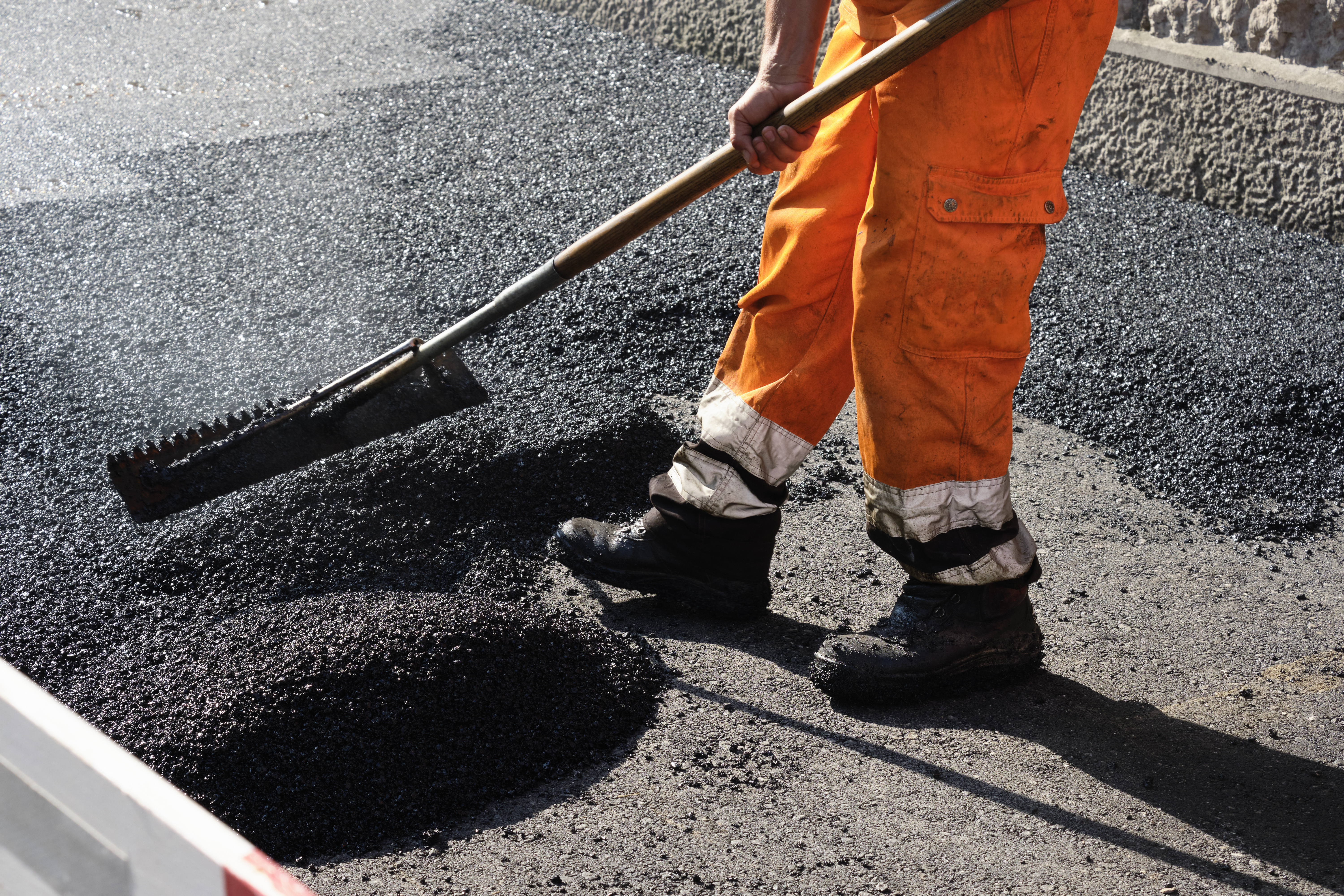If you are a property owner or planning to purchase a property in 2024, you should be aware of the current and projected costs of asphalt. Investing in an asphalt driveway or parking lot can greatly improve the curb appeal and functionality of your property, but it is important to understand the costs associated with this type of improvement. In this post, we will discuss the different factors that can affect the cost of asphalt per square foot in 2024 and provide some tips on how to budget for your asphalt project.
Asphalt Cost Per Square Foot: Pricing Factors
The inflation rate has gone up in recent years; you may be wondering how much you can expect to pay for asphalt per square foot in 2024. According to Forbes, the national average cost of asphalt installation is $7 – $13 per square foot. However, this cost can vary depending on several factors. Depending on the type of asphalt, thickness, and location, the cost can range from $3 – $5 all the way up to $15 – $20 per square foot. Other factors affecting pricing include labor costs, material availability, and equipment needed for the project.
Whether you are planning on paving a new surface or maintaining existing asphalt, understanding these factors will help you estimate the cost of your project.
Material Costs of Asphalt Per Square Foot
Three main types of asphalt commonly used for paving: hot mix asphalt, warm mix asphalt, and cold mix asphalt. Each type has pros and cons and can affect the cost per square foot.
Hot Mix Asphalt (HMA) is the most commonly used material for asphalt surfaces. It is a very durable and high-quality product and is also cost-effective. The average cost of HMA ranges from $40 – $80 per ton. You may ask, how many tons of asphalt do I need for my project? On average, one ton of asphalt covers about 40-100 square feet, depending on the thickness.
Warm Mix Asphalt (WMA) is another material that has gained popularity in recent years. It is produced at a lower temperature than HMA, making it more environmentally friendly and easier to work with. However, this technology comes with an additional cost of $5 – $10 per ton compared to HMA.
Cold Mix Asphalt (CMA) is the most expensive per ton. However, most of the time this type of asphalt is not used for large paving projects. It is typically used for patching and repairing existing surfaces, making it more suitable for smaller projects.
When choosing the type of asphalt material for your project, it’s important to consider its long-term costs. While low-quality materials may save you money in the short term, they can result in costly repairs and replacements in the future. High-quality materials, on the other hand, may have a higher upfront cost but can save you money in the long run.
Asphalt Service Labor Costs
The cost of asphalt service labor can vary depending on the size and complexity of the project and the location. Labor costs may also include equipment rental fees, fuel costs, and any necessary permits or licenses.
Asphalt Paving: On average, labor costs for asphalt paving for a typical 3” thick driveway will cost around $3 to $8.50 per square foot. For larger projects, labor costs may decrease due to economies of scale. If you are paving a parking lot or road, labor costs will vary based on the size and complexity of the project.
Asphalt Repairs: This service involves repairing damaged or deteriorating asphalt surfaces, such as cracks, potholes, and surface depressions. Repair costs can vary depending on the severity of the damage and the size of the affected area. On average, repairs can cost $2 to $5 per square foot. For severely damaged asphalt that needs subbase repair, costs can increase to $5 – $10 per square foot.
Asphalt Sealcoating: This service involves applying a protective coating over the asphalt surface to extend its lifespan and improve its appearance. Labor costs for sealcoating will vary depending on the project size and whether any repairs are needed beforehand. On average, labor costs for sealcoating range from $0.08 – $0.30 per square foot.
Asphalt Resurfacing: Also known as overlay, resurfacing is the process of adding a new layer of asphalt to an existing pavement. This is a cost-effective option for pavements that are still stable but have minor cracks or potholes. Asphalt resurfacing costs range from $3 – $7 per square foot.
Remember, these are average costs and can vary depending on your location and the job. For a detailed guide on asphalt maintenance services, check out this article.
Other Factors that Influence Asphalt Pricing
Several additional factors can affect the pricing of an asphalt project:
- Property Requirements and Thickness: High-traffic areas may require a thicker asphalt layer, ranging from 4 to 7 inches, to withstand stress and wear, increasing the cost. Low-traffic areas, like driveways, typically need only about 3 inches of asphalt.
- Total Surface Area: Larger projects require more material, labor, and time, leading to higher overall costs. However, economies of scale can reduce the cost per square foot for larger projects. The shape of the surface and specific smoothness requirements can also impact costs.
- Preparation and Repairs: Before any new asphalt can be applied, the existing surface must be thoroughly cleaned and repaired. This may include crack filling, pothole patching, or leveling uneven surfaces. The cost of these preparations will vary depending on the extent of repairs needed.
- Geographical Location: Costs for materials and labor can vary significantly depending on where you live. Areas with higher living costs may have higher asphalt prices due to increased demand for skilled labor and materials.
The costs of an asphalt project can add up quickly, but regular maintenance and repairs can help extend the life of your pavement and save you money over time. Make sure to follow maintenance best practices after an asphalt paving project.
Budgeting for Your Asphalt Project
Planning and budgeting for an asphalt project, whether new installation or maintenance, can help homeowners manage costs effectively. Here are some tips:
- Assess Your Needs: Determine whether you need a new installation, resurfacing, repairs, or sealcoating.
- Choose the Right Material: Select the type of asphalt that best suits your project’s requirements and budget.
- Get Quotes: Obtain quotes from reputable contractors to compare prices and services.
- Consider Long-Term Costs: Invest in higher-quality materials and services to minimize future maintenance and repair costs.
It is best to consult with a reputable asphalt contractor to get an accurate estimate for your specific project, taking into account all of these factors. They can also provide recommendations on what steps you can take to reduce costs without compromising the quality and longevity of your asphalt surface.
Get a Pricing Quote on Asphalt Cost Per Square Foot for Your Property
Now that you know the average cost of asphalt per square foot and pricing factors, you need to determine the exact cost for your property. The best way to do this is by getting a pricing quote from reputable asphalt contractors in your area. This will give you an accurate estimate for your specific project and allow you to budget accordingly. If you are looking for a professional contractor to help maintain your asphalt, Superior Asphalt has got you covered. We offer a variety of asphalt repair and maintenance services, including crack sealing and patching, to keep your pavement in top condition. Contact us today for a free quote!


